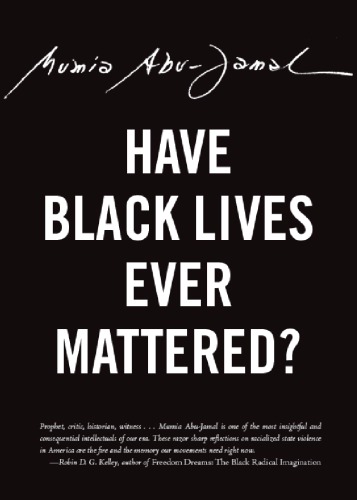
Have Black Lives Ever Mattered?
City Lights Open Media
کتاب های مرتبط
- اطلاعات
- نقد و بررسی
- دیدگاه کاربران
نقد و بررسی

April 17, 2017
The 75 pithy essays collected here, written between 1998 and 2017 by political activist and journalist Abu-Jamal (Live from Death Row), possess the impact and immediacy of the events that precipitated them (half of the essays are set in motion by the recent killings of Trayvon Martin and Michael Brown) while also being haunted by the longer history of police violence. While the author does reflect on the widely reported cases of police violence against African-Americans, as well as on the role of the media in determining what gets attention, the strength of the book rests in the essays that draw attention to lesser-known victims of police violence, particularly women of color whose stories never reached the mainstream media. Over the course of nearly four decades in prison, Abu-Jamal, who was sentenced to death in 1982 for the shooting of a policeman (a conviction that was overturned in 2001), has become an astute student of the justice system as well as a particularly cogent opponent of the death penalty. “The rage of protest,” he observes, is often followed by silence, and “the silent assault of mass incarceration” persists. The brief essays here offer small but potent doses of Abu-Jamal’s informed and impassioned writing.

May 1, 2017
A series of manifestoes in black and white, without any shades of gray.Abu-Jamal (Writing on the Wall: Selected Prison Writings of Mumia Abu-Jamal, 2015, etc.) has spent 35 years in prison, much of it on death row for allegedly killing a police officer in Philadelphia. Despite plenty of popular opposition to the verdict and questions over witness reliability, he remains under a life sentence without possibility of parole. A Black Panther before he became an award-winning journalist, he remains passionately committed to the resistance toward institutional racism. Most of these broadsides are less than two pages and have been sparked by an incident involving a black victim and some embodiment of white oppression, whether it be a cop, a judge, the court system, the FBI, etc. Sometimes the black victim had been suspected or accused of wrongdoing, but such suspicions and accusations were false, in the author's opinion. Too often, the police who arrested, mistreated, or even killed the black victim were exonerated as just doing their job, making them all guilty in Abu-Jamal's eyes. These writings date from the late 1990s and often show prescience on the part of the author, who was writing well before the Black Lives Matter movement that "when the system kills Blacks, there is no outrage, for it has been normalized by centuries of white enslavement, terrorism, and injustice. Such violence is simply the accepted way of how things are." Also included is a series of articles on the killing of Trayvon Martin, accurately anticipating the acquittal of the white man who shot him, and another series on Ferguson and its aftermath--how "Ferguson may prove a wake-up call that Black lives matter. A call for youth to build social, radical, revolutionary movements for change." The last piece is the longest, a pamphlet on how to build such a movement with a historical perspective on why this is necessary. A collection to rally the believers into action rather than persuade doubters or skeptics.
COPYRIGHT(2017) Kirkus Reviews, ALL RIGHTS RESERVED.

Starred review from June 1, 2017
Writer and imprisoned activist Abu-Jamal (Writing on the Wall) assembles commentary written between 1998 and 2017, documenting the historical, contentious relationship between the criminal justice system and the black community. From the beating of Rodney King in 1991 to the death of Tamir Rice in 2014, the author successfully expounds upon their treatment by politicians, media, and the police, while also using historical movements to show how fear, wealth, and government acquiescence normalize police aggression and impunity. In doing so, he sheds light on how each justify the maltreatment of blacks within the justice system and society at large. Abu-Jamal also compares the modern civil rights movement to Black Lives Matter (BLM), detailing the efforts needed to make BLM stronger. These writings draw parallels to court injustices in Philadelphia, where the author was once referred to as "the world's best known death row inmate." VERDICT A must-read for anyone interested in social justice and inequalities, social movements, the criminal justice system, and African American history. An excellent companion to Michelle Alexander's The New Jim Crow and Ava DuVernay's documentary 13th.--Tiffeni Fontno, Boston Coll. Educational Resource Center
Copyright 2017 Library Journal, LLC Used with permission.

























دیدگاه کاربران